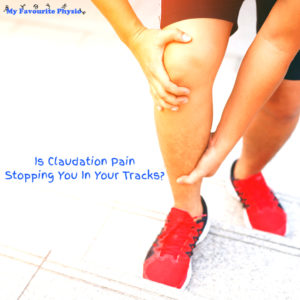03 Nov Experiencing calf pain when you walk uphill or up stairs

Experiencing calf ![]() pain when you walk uphill or up stairs
pain when you walk uphill or up stairs ![]()
Unable to walk more than a few metres ![]() before sharp pains in the calves causes you stop
before sharp pains in the calves causes you stop ![]() and sit down
and sit down
If you answered yes to the above statements, you might be experiencing Claudication ![]()
Claudication is pain caused by too little blood flow to the muscles ,usually during exercise. Sometimes called intermittent claudication, this condition generally affects the blood vessels in the legs,![]() but claudication can affect the arms, too.
but claudication can affect the arms, too.![]() Claudication is a symptom of peripheral artery disease, a potentially serious but treatable circulation problem in which the vessels that supply blood flow to your legs or arms are narrowed.
Claudication is a symptom of peripheral artery disease, a potentially serious but treatable circulation problem in which the vessels that supply blood flow to your legs or arms are narrowed.![]() At first, you’ll probably notice the pain only when you’re exercising,
At first, you’ll probably notice the pain only when you’re exercising, ![]() but as claudication worsens, the pain may affect you even when you’re at rest.
but as claudication worsens, the pain may affect you even when you’re at rest.
Fortunately, with treatment, you may be able to maintain an active lifestyle without pain.![]() Treatment of claudication and peripheral artery disease can help prevent your Claudication from getting worse and reduce your calf pain. Lifestyle changes, such as quitting smoking
Treatment of claudication and peripheral artery disease can help prevent your Claudication from getting worse and reduce your calf pain. Lifestyle changes, such as quitting smoking ![]() and participating in a regular exercise regimen, are often the first steps in treating claudication. Your Expert Physiotherapist
and participating in a regular exercise regimen, are often the first steps in treating claudication. Your Expert Physiotherapist ![]() will be able to carry a thorough assessment and design an individualised treatment plan for you.
will be able to carry a thorough assessment and design an individualised treatment plan for you.
The best way to prevent claudication is to maintain a healthy lifestyle. That means:
![]() Quit smoking if you’re a smoker.
Quit smoking if you’re a smoker.
![]()
![]() If you have diabetes, keep your blood sugar in good control.
If you have diabetes, keep your blood sugar in good control.
![]() Exercise regularly.
Exercise regularly.
![]() Lower your cholesterol and blood pressure levels, if necessary.
Lower your cholesterol and blood pressure levels, if necessary.
![]() Eat foods that are low in saturated fat.
Eat foods that are low in saturated fat.
![]() Maintain a healthy weight.
Maintain a healthy weight.
If your claudication symptoms don’t improve after implementing a formal exercise program ![]() designed to improve the blood flow and adopt a healthier lifestyle, your doctor
designed to improve the blood flow and adopt a healthier lifestyle, your doctor ![]() may suggest other treatment options, including medication, angioplasty or vascular surgery.
may suggest other treatment options, including medication, angioplasty or vascular surgery.
If you are concerned that you might be experiencing Claudication pain in your calf muscles or arm muscles, speak to your family doctor ![]() today.
today.
